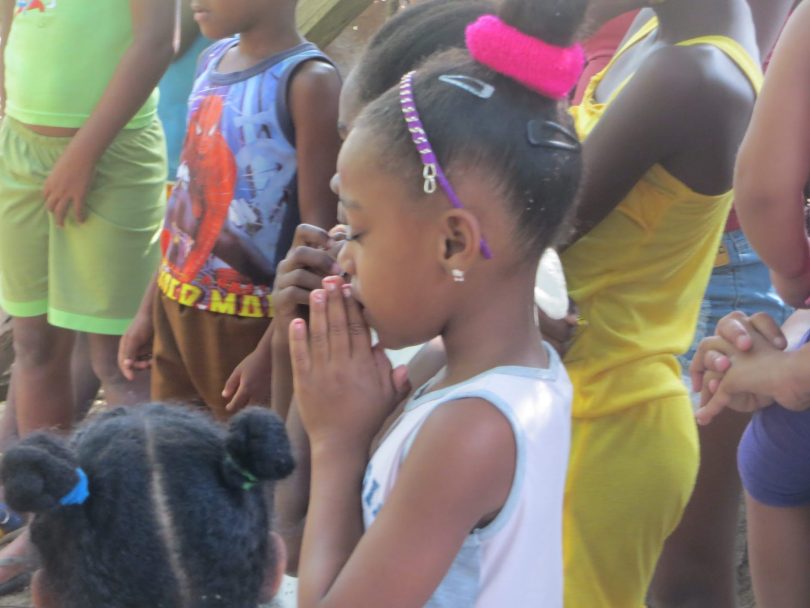Seeking a Mission Rooted in Prayer
By Bishop Chris Giesler
Preaching Texts: Luke 11:1-13, Colossians 2:6-15 [16-19]
How often do you pray? Please take a moment and think about how often you pray. By “prayer,” I mean an honest and heartfelt connection and dialog with God. Prayer is an essential part of the Christian life but often leaves us feeling empty. This happens primarily because we make prayer a one-way conversation that consists mainly of us requesting things from God, even if they deserve to be lifted to God. Again, prayer is a two-way conversation that allows time for listening as it does in knowing that God hears us.
In our Gospel lesson for today, one of Jesus’ disciples sees Jesus at prayer. This unnamed disciple has no doubt seen the fruit of Jesus’ connection with God in his times of prayer and wants Jesus to teach him how to pray in like manner. In other words, I hear the disciple’s plea to be something like, “I see how prayer feeds your life; I want that as well. Teach me how.”
In keeping with his context, Jesus refers to God as “Father,” as a loving parent. Prayer is, after all, a personal dialog with one who loves you and has your best interests in mind for the short and long term. Jesus also intimates that while God is loving and kind as a parent, God is also to be revered and honored. When we pray, it is not like talking to our best friend; we are making a connection with the creator of the universe! God deserves to be honored, worshipped, and we should humble ourselves when we share time with God, so we begin our prayer, “Our Father in heaven, hallowed be your name.”
The rest of the prayer then flows out of this relationship:
- We ask for God’s kingdom to be made real among us
- We ask for our daily sustenance in bread
- We ask for our sins to be forgiven and the will to forgive the sins of others.
- We ask to be delivered from trial or temptation
We should not rush through these stages of prayer, checking them off the list, thinking that we have covered all the bases. We should instead pause between each petition, pondering how this prayer calls us into mission. Here we focus our attention on these things:
- When we ask for God’s kingdom to be made real among us we should ask “what can we do to make God’s kingdom real in the lives of those around us?”
- We ask for our daily sustenance in bread, we should stop to ponder what can we do to help others have enough food to eat.
- As we ask for our sins to be forgiven, we should ponder how we can forgive the sins of others.
- As we ask to be delivered from trial or temptation, we should stop to ponder how we have hurt others and how our actions have caused pain in the lives of others.
Again, prayer is a two-way dialog that connects us with God but also gives us time to hear God’s call.
In Luke 11:5-8 Jesus underscores that God is our friend, and even though our first request might seem to fall on deaf ears, a good friend will eventually respond to our need. There is an apparent weakness in the illustration, but the underlying teaching here is about our persistence, not God’s unwillingness to budge at first.
Jesus underscores the teaching of persistence by advising his disciples to “Ask, Search, and Knock” because it will be given to the one who asks. The one who searches will find what they need. The door will be opened to the one who knocks. This is good news, but we must tread carefully here. At face value, Jesus seems to be saying that anything we ask for will be granted. Folks often interpret it this way and, as a result, get very disappointed when they don’t receive what they have asked for. Believe me, it hurts when the loved one is not healed, when the money to pay the mortgage does not show up, and when the car breaks down again. God does answer prayer but does so in accord with a greater sense of justice and mercy than we can’t always understand at any given time. We see only the immediate future; God sees with eternity in mind. We also live in a world where we can give in to our weaker selves and thus suffer negative consequences. In other words, we can say things that we later regret, we do things that hurt others. As a result, there are times even the most passionate prayer will not save us from ourselves and our mistakes. My friends, prayer is not the spiritual equivalent of sitting on Santa’s lap and sharing what we want. Prayer is not our opportunity to step into God’s will and to impose our will on God.
While Jesus does not say it here, he will at the Garden of Gethsemane just minutes before his arrest. There Jesus does pray earnestly and honestly that this cup of suffering pass might from him, but he ends his prayer with “Not my will, but your will be done.” Here Jesus is finishing the lesson on prayer by ultimately placing himself in God’s hands and following God’s will.
This should speak volumes to us as we seek to discern our mission as part of God’s will for us.
From our reading of Paul’s letter to the Colossians, we see that ultimately, prayer is essential in the process of being rooted and built upon Christ. As Paul so often does, we see there is a difference between following the ways of the world and being rooted in Christ. Again, prayer is a conversation that keeps us connected to God; it is essential to being rooted in God’s ways.
The problem is, without even thinking about it, we dialog constantly with elements of mass media that tell us what we need to look like, smell like, act like, and live like. We hear it on the radio, see it on TV, drive by it on billboards, and can’t miss it on the sides of buses and pasted on the subway next to the map of where this train will stop.
God has a very different message for us, and we can only access that through a life of prayer. Jesus’ life and message is rooted in what God wants for us as well, to love those around us unconditionally, to lift up those who are bowed down, to feed and give drink to those who are hungry or thirsty, and most importantly to remove the barriers that keep others from the kingdom of God.
In the very center of the Lord’s prayer is the petition “Thy will be done on earth as it is in heaven.” And that is our call to mission. To make the kingdom of God present with the words that we use, the money and time that we spend, and the grace that we extend. I would challenge you to begin each day in this coming week by praying the Lord’s Prayer. And pausing after each petition ponder how you are being called to bring the presence of Christ into the world.







